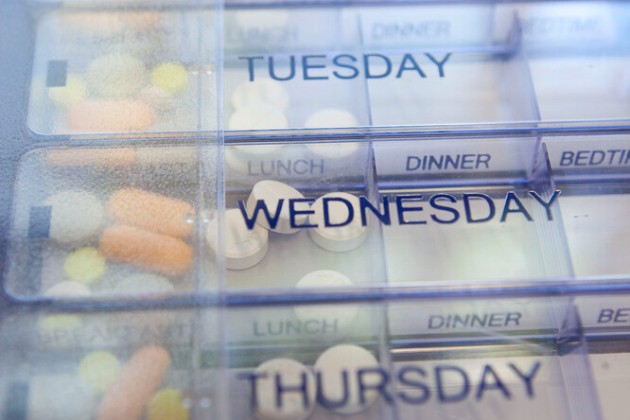Some medications are more time-critical than most. There are conditions that require particularly urgent medical attention. These might develop rapidly, such as sepsis, or might be conditions many patients live with – such as Parkinson’s disease or type 1 diabetes – that can deteriorate without much warning.
Just 42% of people with Parkinson's disease admitted to hospitals in England get their medication on time, every time, according to a 2023 report from Parkinson's UK which highlights the importance of time-critical medications.
We all have a part to play in ensuring that patients get the right access to the right medicines at the right time
One patient told the charity how not getting their medication on time delayed their recovery, traumatising them. It can leave patients unable to move, swallow, walk or talk. In especially severe cases, this can lead to Parkinson’s Hyperpyrexia Syndrome, with symptoms such as muscle rigidity, fever, reduced consciousness, and possibly even leading to death.
The report added that a quarter of NHS trusts don’t have policies allowing those with Parkinson’s to take their own medication in hospitals. Only 52% require staff responsible for prescribing and administering medication to have training on time-critical medication.
What nursing staff should know
Whatever your specialty, it’s worth considering time-critical medications within your practice.
- Know the basic definitions. The Institute for Safe Medication Practices categorises time-critical medicines as: “those where early or delayed administration of maintenance doses of greater than 30 minutes before or after the scheduled dose may cause harm or result in substantial sub-optimal therapy or pharmacological effect.”
- Understand your own role. Nursing staff are often involved in the entire administration of time-critical medications, from delivering them in the first place to monitoring responses. When nurses are independent prescribers, they also oversee the prescribing and management of medications.
- Pay attention to the barriers. These might range from workforce shortages to trusts not using e-prescribing to accurately report whether patients have received their medication when they should.
If you’re concerned about a colleague’s mishandling of time-critical medications, you should speak up. You might see it happen but be afraid or unclear about voicing it. But doing so can save patients’ lives, as well as being part of the Nursing and Midwifery Council code, which includes the need to preserve safety and promote professionalism and trust within nursing. It also encourages healthy wellbeing and psychological safety in the workplace.
Read the RCN guidance on raising concerns. We can provide additional support throughout the process if needed.
“Time-critical medication is vital for all nursing staff to consider, no matter the clinical setting. We all have a part to play in ensuring that patients get the right access to the right medicines at the right time, which can be difficult in often complex and challenging environments," says Callum Metcalfe-O'Shea, RCN Professional Lead for Long-Term Conditions.
“It’s important to apply a person-centred approach when considering time-critical medication, utilising relatives and carers where possible to support the administration process. Nursing staff are in a great position to build strong therapeutic relationships with patients and can work together to ensure medications are administered promptly.”
The breadth of time-critical medications
Epilepsy is another condition where medication delays can have dangerous consequences. According to a joint statement published by Parkinson's UK, for 48% of these patients, missed medication increases the risk of seizures. This can lead to poorer quality of life outcomes, or even Sudden Unexpected Death in Epilepsy (SUDEP).
Sepsis can arise from a minor ailment, but if not recognised or treated rapidly, may lead to organ failure or death. Antibiotics, a key component of treatment, are associated with poor outcomes if administration is delayed.
“If infection is thought to be the cause of patient deterioration, antimicrobials must be given promptly, then changed or discontinued when more test results are available. The Academy of Medical Royal Colleges and National Institute for Health and Care Excellence recently provided guidance on the timeframe for administration of antimicrobials depending on patient presentation, NEWS 2 score and likelihood of infection," explains Suman Shrestha MBE, RCN Professional Lead for Critical Care.
You might encounter time-critical medications in your personal life too. “As both senior health care assistant in the emergency department and parent of a daughter with type 1 diabetes, I've seen first-hand the vital importance of time-critical medications," says Helena Petrisor, RCN Diabetes Forum steering committee member.

“Ensuring my daughter’s insulin is administered at the correct time can be life-saving, keeping her blood sugar levels stable and helping prevent serious complications like diabetic ketoacidosis.
“In my emergency department role, I see how crucial timing is when administering medications such as antibiotics for sepsis, anticoagulants for suspected strokes, or emergency treatments for acute asthma attacks. Doing so promptly can make significant differences in patient outcomes and save lives.”
Find out more
- Find out how these nursing staff deal with their own long-term conditions.
- Explore this educational podcast on Parkinson's disease.
- Read RCN Neuroscience committee member Emma Edwards’ blog on her role as Parkinson's specialist nurse.








